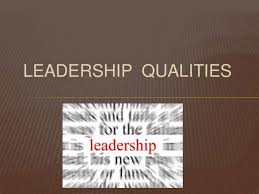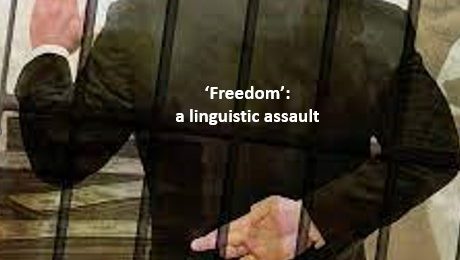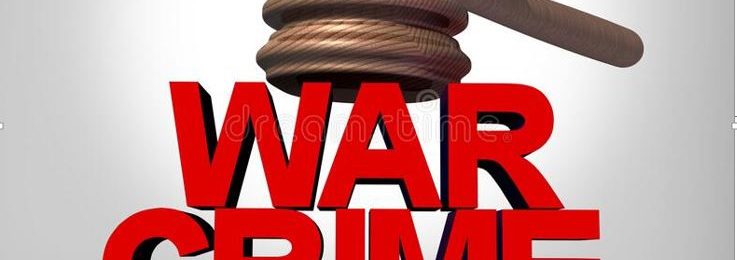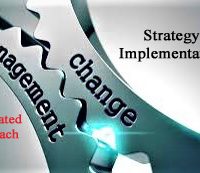
It is important to understand that just because someone holds a position of leadership, does not mean they should. Not all leaders are created equal. The problem that is sometimes encountered is a “recognition problem” – we don’t always recognize good leaders from bad leaders, those that may have the necessary skill and ability, but lack the important overall qualities of leadership to effectively lead. For example, leaders who lack character or integrity will not endure the test of time. It doesn’t matter how intelligent, affable, persuasive, or savvy a person is, if they are prone to rationalizing unethical behavior, they will eventually fall prey to their own undoing, potentially damaging or taking down an organization with them. Optics over ethics is not a formula for success.[1]
Leadership is the process by which one individual influences the behaviours, attitudes and thoughts of others. Leaders set the direction, and can guide businesses or nations in either a positive or negative direction. In nearly every aspect of public and private life, the ability to inspire others to work towards positive and ethical change is critical to the success of organizations, businesses, political and governmental institutions, and communities. People want to believe in the ability of their leaders to guide change and achieve success.
The articulated need for leadership is due, in significant part, to an apparent deficit of effective and ethical judgment and decision-making in our communities, on Bay Street or Wall Street, and in government.[2] Leadership is not in itself noble or evil, and depending upon the particular values behind it, it is a tool that can be used by anyone for any number of purposes.[3] As such, ethics are a key element of leadership. They are the inner compass that motivates and directs a leader toward what is good and fair, and ethics help guide leaders in using their skills for noble purposes.[4]
There are some things you don’t take liberty with no matter how innovative you are when you lead. For instance, to have integrity means to tell the truth. To be ethical is to do the right thing. These are not fuzzy concepts.
– Rosa Say
In recent years, the number of news stories regarding ethical lapses at many leading organizations and government institutions remind us of the critical importance of a strong ethical culture. From a business perspective, regulators and enforcement authorities around the world are progressively of the view that an ethical and compliant business culture is one of the most important tasks for corporate boards and C-suite executives. In this environment, companies must ensure they have sustainable cultures of integrity that empower personnel at all levels to make the right decisions in light of whether it is right, legal, and fair.[5] This applies equally to government institutions.
Regulators in the Canada, U.S., in the UK, and Australia, understand that organizations without a “culture” of integrity (i.e. clear organizational values to behave legally and ethically, appropriate tone from the top leadership, middle managers who carry the banner turning principles into practice) are likely to view their ethics and compliance programs as a set of “check the-box activities”, or worse, as a roadblock to achieving their business objectives. Organizations responsible for some of the most egregious acts of malfeasance have had quite impressive, formalized ethics and compliance guidelines. The problem was that either leadership or a group of influential insiders operated outside of those guidelines and shaped the true culture of the organization.
The culture of an organization – or a government – is the expression of its values in action; and to be successful it is up to those who shape it—in particular its leaders and the people following.
At all times, but most particularly of late, ethics and integrity is neither a luxury nor an option.
Although individual strengths and abilities may vary, most experts agree that outstanding leaders tend to view the world in similar ways. A solid set of values is particularly important, as is a commitment to high ethical standards. A leader is someone who inspires others, who leads by example and motivates people to be better and move forward no matter how difficult the challenges might be. No matter if you are leading a country, a business, or even a household.[6]
Leaders must lead with their actions as well as their words. Leadership is the act of setting the right example for those who follow. Leaders’ actions set an unspoken standard about what is appropriate and what is not. Authenticity is a key quality of leadership.[7] Followers within an organization or a nation learn about acceptable behaviours through observation – watching, learning and imitating what leaders do.[8]
If your actions inspire others to dream more, learn more, do more, and become more, you are a leader.
– John Quincy Adams, 6th President of the United States
Good leaders must lead by example. By walking your talk, you become a person others want to follow. Leadership is about “basic human decency” and “right and wrong”.[9] When leaders say one thing, but do another, they erode trust – a critical element of productive leadership.[10]
That’s all a man can hope for during his lifetime – to set an example – and when he is dead, to be an inspiration for history.
– William McKinely, 25th President of the United States
Two recent ‘real world’ examples demonstrate the importance of leadership qualities and leading by example, or the lack thereof. The first example is from the business world (the Wells Fargo scandal) and the second example from the political sphere (Donald Trump and the U.S. presidential election).
With respect to the first example involving business leadership and Wells Fargo – the second largest bank in the United States – its recent corporate behaviour has been referred to by U.S. Regulators as “outrageous” and a “major breach of trust”. The bank paid a $185 million fine and apologized for its employees illegally opening millions of unauthorized credit card and bank accounts in order to meet aggressive sales targets set by senior executives. Approximately 5,300 Wells Fargo employees were terminated by senior management in connection with the behaviour, most of them low ranking staff. At a hearing on Capitol Hill in September 2016, Senator Warren told the CEO that he should resign in light of the fact that not a “single senior executive” had been fired and the CEO had personally earned over $200 million while the fraud took place under his program. Senator Warren called the CEO a “gutless leader” who should be criminally investigated by the department of Justice and the Securities and Exchange Commission.
It has been subsequently learned that between 2010 and 2014 (if not earlier) at least five Wells Fargo employees had sued the bank or filed complaints with regulators alleging they were terminated after reporting to senior Wells Fargo management the opening of customer accounts without their permission or consent. Questions are now being raised as to how early Wells Fargo knew about such allegations and how the executives handled them. The Wells Fargo board has initiated its own internal investigation, and the CEO has now resigned.
Although there were a number of issues in play in respect to the fraud, a particularly troubling issue was poor leadership – the Board and CEO did not lead by example and did not ensure the culture of the Bank supported principled and values based performance. As a result, the exposed corporate wrongdoing sparked the biggest banking scandal since the financial crisis, including demands for a criminal investigation and personal liability of Wells Fargo’s executives and board, and renewed calls for the breakup of the nation’s largest banks. The U.S. Federal Reserve promised to scrutinize all big banks in wake of the scandal, and is conducting “a broad review of big bank compliance regimes”.[11]
With respect to companies, regulators understand the importance of corporate culture, organizational values, tone at the top, and leading by example.[12] As a fundamental component of an effective ethics and compliance program, ‘culture’ is referenced by the U.S. Federal Sentencing Guidelines for Organizations, which includes an expectation for companies to promote an “organizational culture that encourages ethical conduct” and “compliance with the law.”[13]
John Kasich, the Governor of Ohio and one-time Republican presidential hopeful, criticized the Wells Fargo bank as “compromised by greed”, and suspended business with the bank for one year, stating that “we need to send a message to this company – and every other company – that the public must be respected, that ethical standards must be respected, and when they’re not it comes with a cost”.[14] Governor Kasich questioned what the Board had been doing, stating that there was a “deeper issue of the value structure” within the organization and the “values of its leaders”, there being a lack of “individual morality in values that matter”. Pertaining to Wells Fargo bank’s leadership, Governor Kasich stated that “they ought to clean house”.[15]
The second ‘real world’ example is found within the political sphere, in particular the pending U.S. election, and involves the shocking leaked 2005 recording of presidential nominee Donald Trump boasting about being able to “grab” women because “when you’re a star they let you do it”.[16]
You know I’m automatically attracted to beautiful – I just start kissing them. It’s like a magnet. Just kiss. I don’t even wait. And when you’re a star, they let you do it. You can do anything. Grab them by the p—y. You can do anything.
– Donald Trump, recording of conversation about women in 2005, Access Hollywood video[17]
This was not an isolated incident, although possibly the most outrageous, as Mr. Trump has a “long history of objectifying” and “demeaning” women,[18] as illustrated in the following reported comments:[19]
- “You know, it doesn’t really matter what [the media] write as long as you’ve got a young and beautiful piece of ass. But she’s got to be young and beautiful”.
- “Look at that face. Would anyone vote for that, the face of our next president? I mean, she’s a woman, and I’m not supposed to say bad things, but really, folks, come on. Are we serious?” [directed at Carly Fiorina, former Hewlett-Packard CEO and former Republican candidate rival for presidential nominee]
- “If Hillary Clinton can’t satisfy her husband what makes her think she can satisfy America?”
- “Pocahontas is at it again! Goofy Elizabeth Warren, one of the least productive U.S. Senators, has a nasty mouth. Hope she is V.P. choice.” [U.S. Senator Elizabeth Warren]
- “All of the women on The Apprentice flirted with me – consciously or unconsciously. That’s to be expected”.
- “If I were running ‘The View’, I’d fire Rosie O’Donnell. I mean, I’d look at her right in that fat, ugly face of hers, I’d say ‘Rosie, you’re fired’.”
- “Bimbo”. [directed at TV journalist Megyn Kelly]
- “The face of a dog”. [New York Times columnist Gail Collins]
- “While @BetteMidler is an extremely unattractive woman, I refuse to say that because I always insist on being politically correct”.
- “And the girls – we’re supposed to call them women, but they’re girls to me.”
- “You have to treat them like s–t”.
This type of language from a leader – that can fairly be characterized as “hurtful, hateful language”[20] – are examples of negative leadership that have the ability to undermine important ethical values and principles in society and within our institutions.[21]
In this type of case involving a political leader (as opposed to a business leader, such as a CEO or board of directors), are there ramifications when generally understood ethical standards appear to be ignored or disrespected? In this case:
- Similar to his position on the Wells Fargo business scandal, Governor Kasich said he could not support a presidential “nominee who has behaved in a manner that reflects so poorly on our country”, noting that the U.S. “deserves better”.[22] Governor Kasich appears to base his analysis with respect to Mr. Trump on principles of ethics and leadership, stating that our political leaders must “lead by example”.[23]
- The Arizona Republic newspaper in its 126 year history has always endorsed a Republican for president. This reflects a deep philosophical appreciation for conservative ideals and principles. However, the editorial board has now stated that it will not support republican candidate Donald Trump as the leader of the country for a number of reasons, not least being that his history of “objectifying women and his demeaning comments about women” are evidence of “deep character flaws”, and are part of a pattern showing “a stunning lack of human decency, empathy and respect”. The editorial board found that Mr. Trump did not “grasp” America’s “national ideals”, that women’s rights are “human rights”, and that he did not understand “that America’s commitment to human rights is a critically needed beacon in today’s troubled world”. [24]
Leadership qualities matter – for both business leaders and political leaders.
Trump has consistently normalized violence, sexual deviance, bigotry and hate speech. I wouldn’t accept this from my seventh-grade son, much less from a potential leader of the free world.
– Jen Hatmaker, U.S. author of popular inspirational Christian books: “one small sign of the splintering of the evangelical bloc”[25]
Leadership influences the behaviours, attitudes and thoughts of others, and can guide businesses or nations in either a positive or negative direction. As a political leader, what do the presidential nominee’s words reflect as to his values, ethics and principles for a company or a nation? What is the tone from the top? What banner will people listening to his message carry forward, what principles will be turned into practice? The answers will play out over the next few weeks leading up to the United States presidential election.
Being the leader of the free world requires a sense of propriety that Trump lacks.
– Editorial Board, Arizona Republic newspaper (first time in 126 year history did not support a Republican for president of the United States)
The modern business leader is generally expected to be a consummate team player, committed to a strong ethical culture and compliance, supporting equality and diversity, good at handling risk, and adept at dealing with the press.[26]
The most commonly observed qualities in outstanding leaders include: character, integrity, honesty, delegation, communication, focus, confidence, passion, innovation, forward-looking, competent, patience, stoicism, authenticity, open-mindedness, decisiveness, empowerment, commitment, positive attitude, creativity, inspirational, intuition, empathy, transparency, approach, accountability, optimism, and principle, among others.
In matters of style, swim with the current; in matters of principle, stand like a rock.
– Thomas Jefferson, 3rd President of the United States
For a business or political leader, simply possessing one or more of these qualities or traits is not sufficient, it is equally important to exhibit, model and display these qualities. Of the list of important leadership qualities, six of the topmost qualities that make a great leader include the following:[27]
6. Courage – The list of characteristics that comprise great leadership is long, but ‘courage’ informs and strengthens all others. In a tenuous economy, people tend to keep their heads down and their mouths shut in order to survive, both front line and management. These are the times that call for courageous leadership. Courage is a learned business or political skill based on reasoned judgment and calculated risk-taking. As there is no certainty in life or business, every commitment made and every action taken entails a risk of some kind, but taking the necessary action while staying calm and confident reflects an assertive but reflective disposition. People will take their cue from their leaders, stepping up to the plate, raising difficult issues and addressing challenging and demanding matters – or not.
Courage is rightly considered the foremost of the virtues, for upon it, all others depend.
– Winston Churchill
5. Humility – great leaders are strong and decisive but also humble. The best leaders are acutely aware of how much they don’t know. They have no need to be the smartest person in the room, but have the unyielding desire to learn from others. Humility means that a leader has the self-confidence and self-awareness to recognize the value of others without feeling threatened.
The more you contain your ego, the more realistic you are about your problems. You learn how to listen, and admit that you don’t know all the answers. You exhibit the attitude that you can learn from anyone at any time. Your pride doesn’t keep you from sharing the credit that needs to be shared. Humility allows you to acknowledge your mistakes.
– Larry Bossidy, Execution
As noted in the Harvard Business Review twenty years ago, a country is not a company. What people learn from running a business won’t necessarily help them formulate economic policy. A country is not a big corporation. The habits of mind that make a great business leader are not, in general, those that make a great economic analyst; an executive who has made $1 billion is rarely the right person to turn to for advice about a $6 trillion economy.[28] The key for such a leader to be effective as a nation builder is to have humility, to control their ego, and exhibit the ability to learn from all appropriate subject matter experts around them.
4. Accountability – Real leaders are accountable. Many want to be leaders, but few are prepared to accept the accountability that goes with it. No organization can grow and prosper unless its leaders step up and take responsibility. It is easier to assign blame than to hold oneself accountable. However, the acceptance of leadership is a great responsibility. Great leaders must take personal responsibility for their actions when things go wrong. To be a great leader one must embrace letting the team own the wins, while assuming responsibility for risks and failures and focusing on the solution.
The buck stops here.
– Harry Truman, 33rd President of the United States
3. Inspiration – Leaders are inclusive, and act to enthuse and inspire their people to feel invested in the goals and accomplishments of the company, government institution, or country. Everyone wants to be associated with a leader that makes a positive difference in the world.
The leader using passion, purpose and inspiration will always outperform the leader using pressure, pain and insults.
– Ty Howard
2. Integrity, honesty and ethics– Great leaders are honest and transparent, and have high integrity. Honesty and ethical behaviour is a key value, such leaders behaving in a consistent, highly ethical and fair manner. Tone from the top. If a leader makes honesty and ethical behaviour a key value, people will look to emulate. This is leadership by example: They do what they say they are going to do, and they walk their talk. The core of integrity is truthfulness and strong moral principles. Integrity requires a leader to always tell the truth and be fair, to all people, in every situation. Citizens or employees are a reflection of the values we embody as leaders. Integrity is important as people will be looking to the leader on how to behave. Inaccurate representation affects everyone.
The supreme quality for leadership is unquestionable integrity. Without it, no real success is possible.
– Dwight D. Eisenhower, 34th President of the United States
1. Character – There is no consensus on a definition of character, however, character refers to the way someone thinks, feels and behaves, and essentially encompasses the above referenced qualities. A trusted leader is someone people can trust and admire, and reflects the values, traits and virtues that others – shareholders, employees, customers, suppliers, regulators, citizens and the broader society within which they operate – will use to determine if they are good leaders. The truth of a leader’s character is reflected in the choice of their actions, showing consistency between their values, ethical reasoning and conduct. Leadership style sets the tone and approach. It is the classic ‘follow-the-leader” situation where people watch and mimic how things are done from top leadership on down. One should always lead in a way that the leader wants copied – because it will be.
Character is the only secure foundation of the state.
– Calvin Coolidge, 30th President of the United States
Many challenges that leaders in business and politics face involve questions of values. At this time in our history, we need our leaders – in particular our CEOs, Prime Ministers, and Presidents – to embrace good governance, ethical compliance, and positive qualities of leadership.
In a president, character is everything. A president doesn’t have to be brilliant… He doesn’t have to be clever; you can hire clever… You can hire pragmatic, and you can buy and bring in policy wonks. But you can’t buy courage and decency, you can’t rent a strong moral sense. A president must bring those things with him… He needs to have, in that much maligned word, but a good one nonetheless, a “vision” of the future he wishes to create… But a vision is worth little if a president doesn’t have the character– the courage and heart– to see it through.
– Peggy Noonan
Values drive behaviours, and behaviours drive outcomes.
American values are not luxuries but necessities – not the salt in our bread, but the bread itself. Our common vision of a free and just society is our greatest source of cohesion at home and strength abroad.
– Jimmy Carter, 39th President of the United States
In nearly every aspect of public and private life, the ability to inspire others to work towards positive and ethical change is critical to the success of organizations, businesses, political and governmental institutions, and communities.
The qualities of ethical and principled leadership matters.
Eric Sigurdson
Endnotes:
[1] Mike Myatt, 15 Ways to Identify Bad Leaders, Forbes, October 18, 2012.
[2] See for example, Eric Sigurdson, Lawyers and Leadership: effective and ethical judgement and decision-making required to address societal and professional challenges, Sigurdson Post, September 5, 2016; Eric Sigurdson, Corporate Culture, Leadership and Personal Liability – Ethics and Compliance Programs in the 21st Century, Sigurdson Post, October 5, 2016.
[3] Geoff Colvin, What Donald Trump’s Rise Teaches us about Leadership, Fortune, March 1, 2016.
[4] Chris Newton, The Importance of Leading by Example, Smallbusiness.chron.com.
[5] Eric Sigurdson, Corporate Culture, Leadership and Personal Liability – Ethics and Compliance Programs in the 21st Century, Sigurdson Post, October 5, 2016.
[6] Ten Qualities of Outstanding Leaders, Dale Carnegie.com; Shearin Group Ten Qualities of Outstanding Leaders, May 21, 2014.
[7] Jena McGregor, Michelle Obama’s epic New Hampshire speech was a master class in speaking from the gut, Washington Post, October 14, 2016.
[8] Chris Newton, The Importance of Leading by Example, Smallbusiness.chron.com.
[9] Daniel Dale, Donald Trump responds with fury to sexual assault allegations, Toronto Star, October 13, 2016; Full transcript of Michelle Obama’s powerful New Hampshire speech, The Guardian, October 14, 2016.
[10] Carl Golden, Top 10 Ways to Lead by Example, soulcraft.co; Chris Newton, The Importance of Leading by Example, Smallbusiness.chron.com.
[11] For a more in-depth discussion of the Wells Fargo scandal, see: Eric Sigurdson, Corporate Culture, Leadership and Personal Liability – Ethics and Compliance Programs in the 21st Century, Sigurdson Post, October 5, 2016.
[12] See: Eric Sigurdson, Corporate Culture, Leadership and Personal Liability – Ethics and Compliance Programs in the 21st Century, Sigurdson Post, October 5, 2016.
[13] Deloitte, Corporate Culture: The second ingredient in a world-class ethics and compliance program, 2015 [http://www2.deloitte.com/content/dam/Deloitte/us/Documents/risk/us-aers-corporate-culture-112514.pdf]
[14] Katie Reilly, John Kasich Bans Wells Fargo From State Business Over Culture of “Greed”, Fortune, October 15, 2016.
[15] Allan Smith, John Kasich’s dire warning for the Republican Party: Evolve or Die, Business Insider, October 16, 2016.
[16] Allan Smith, Kasich: The shocking Donald Trump tapes are not ‘surprising to me or many others’, Business Insider, October 8, 2016; Allan Smith, John Kasich’s dire warning for the Republican Party: Evolve or Die, Business Insider, October 16, 2016.
[17] David A. Fahrenthold, Trump recorded having extremely lewd conversation about women in 2005, Washington Post, October 8, 2016. Also see, Evan Halper, Michelle Obama delivers what may be a defining moment in the presidential campaign, Los Angeles Times, October 13, 2016 – “First Lady Michelle Obama starred in a defining moment of the presidential race Thursday, delivering a stinging and emotional condemnation of Donald Trump’s behavior toward women that framed the election as no longer about ideology, but human decency.”
[18] Editorial Board, Endorsement: Hillary Clinton is the only choice to move America ahead, The Arizona Republic (azcentral.com), October 13, 2016.
[19] Claire Cohen, Donald Trump sexism tracker: Every offensive comment in one place, The Telegraph, October 8, 2016; Michael Sebastian, 27 Times Donald Trump Has Been Completely Insulting to Women, Cosmopolitan, October 13, 2016; Nina Bahadur, 18 Real Things Donald Trump Has Actually Said About Women: Yes this man is running for president, Huffington Post, August 15, 2015; Andrea Gonzalez-Ramirez, What Donald Trump Has Said About Women, Refinery29, August 4, 2016; Julie Baumgold, Fighting Back: Trump Scrambles off the Canvas, New York Magazine, November 1992; Sarah Burton, 11 Inspirational Quotes About Women From Donald Trump, Buzzfeed.com, May 19, 2016; Cristina Silva, 42 Horrible Things Donald Trump Has Said About Women: Is the next republican presidential nominee a misogynist?, International Business Times, March 29, 2016; Alexandra Svokos, Women Hold Up Signs with Donald Trump’s Most Sexist Quotes, Elite Daily, April 11, 2016; Lauren O’Neil, Women read sexist Donald Trump quotes in powerful new attack ad: new anti-Trump ad features horrible things Donald Trump has said about women, as read by women, CBC News, March 15, 2016; Gail Collins, Donald Trump Gets Weirder, New York Times, April 1, 2011.
[20] Timothy Egan, Burning Down the House, The New York Times, October 14, 2016. [Remarkably, in last Sunday’s presidential debate, the moderator Anderson Cooper was required to “school a 70-year-old man” – the CEO of a company, a candidate for President of the United State – “on workplace taboos that most of us learn on our first job”, if not much earlier from our family, our peers, our teachers, our friends].
[21] Also see, Marcus Gee, Trump has crashed the Republican Party, and it’ll never be the same, Globe and Mail, October 16, 2016 – “the Republican party has failed the greatest test a political leader or party can face, and failed spectacularly. It has abandoned its principles…”.
[22] Allan Smith, Kasich: The shocking Donald Trump tapes are not ‘surprising to me or many others’, Business Insider, October 8, 2016.
[23] Allan Smith, John Kasich has 3 words of advice for Republicans torn over how to handle Donald Trump, Business Insider, October 13, 2016; Allan Smith, John Kasich’s dire warning for the Republican Party: Evolve or Die, Business Insider, October 16, 2016.
[24] Editorial Board, Endorsement: Hillary Clinton is the only choice to move America ahead, The Arizona Republic (azcentral.com), October 13, 2016.
[25] Laurie Goodstein, Donald Trump Reveals Evangelical Rifts that could Shape Politics for Years, New York Times, October 17, 2016 – “When Jen Hatmaker speaks to stadiums full of Christian women, she regales them with stories about her five children and her garden back in Austin, Tex. — and stays away from politics. But recently she took to Facebook and Instagram to blast Donald J. Trump as a “national disgrace,” and remind her legions of followers that there are other names on the ballot in November. … Ms. Hatmaker’s outraged post was one small sign of the splintering of the evangelical bloc and a possible portent of the changes ahead. While most of the religious right’s aging old guard has chosen to stand by Mr. Trump, its judgment and authority are being challenged by an increasingly assertive crop of younger leaders, minorities and women such as Ms. Hatmaker.”
[26] Schumpeter, The Trump in every leader, The Economist, September 5, 2016.
[27] Tanya Prive, Top 10 Qualities that make a Great Leader, Forbes, December 19, 2012; Peter Enonomy, Top 10 Skills Every Great Leader Needs to Succeed, Inc., December 29, 2014; Adam and Jordan Bornstein, 22 Qualities that make a Great Leader, Entrepreneur, March 22, 2016; Top 10 Characteristics of Good Leaders, Business Ideas Lab (businessideaslab.com); Peter Economy, The 9 Traits that Define Great Leadership, Inc.com, Jan. 24, 2014; Tegan Jones, 10 Impressive Characteristics Great Leaders Have, Life Hack (lifehack.org); Robert Hewes, Top Ten Traits of Great Leaders, American Management Association; Bryan Tracy, The Top 7 Leadership Qualities and Attributes of Great Leaders, briantracy.com; Ten Qualities of Outstanding Leaders, Dale Carnegie.com; Peter Barron Stark, A Leader’s Attitude is Contagious – For Better or Worse, peterstar.com, March 10, 2014; Simone Wright, The 7 Attributes of Intuitive Business Leaders, Huffington Post, September 17, 2014; Jamie Glass, Artfulthiners, Good Business Leaders Use Intuition to Make Decisions, Blogher.com, May 8, 2013; Bill Treasurer, Courage is the Key to Great Leadership, Entrepreneurs’ Organization; Susan Tardanico, 10 Traits of Courageous Leaders, Forbes, January 15, 2013; Michael Hyatt, How Real Leaders Demonstrate Accountability, michaelhyatt.com; Mike Myatt, 15 Ways to Identify Bad Leaders, Forbes, October 18, 2012;
[28] Paul Krugman, A Country is Not a Company, Harvard Business Review, January-February 1996 Issue.








